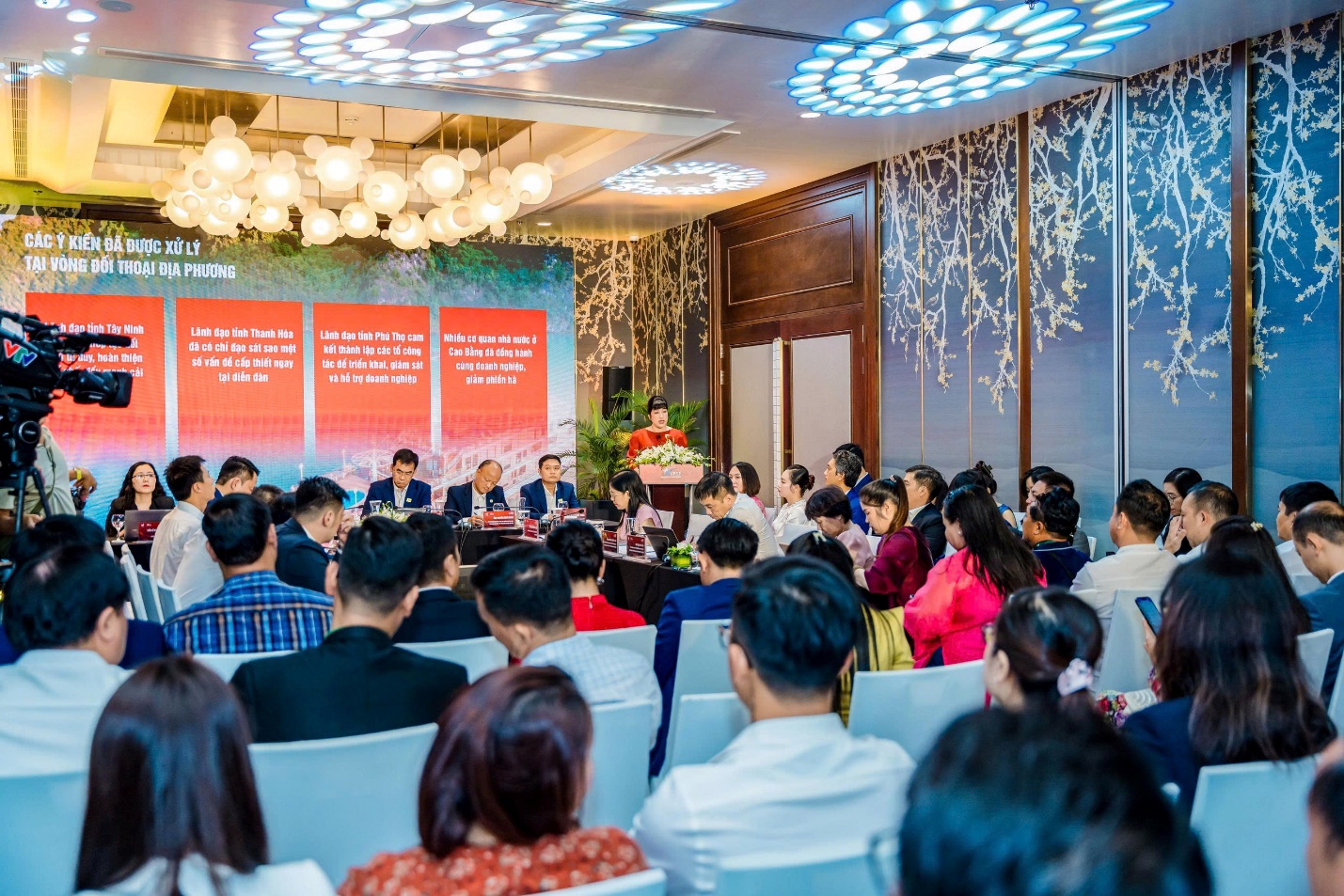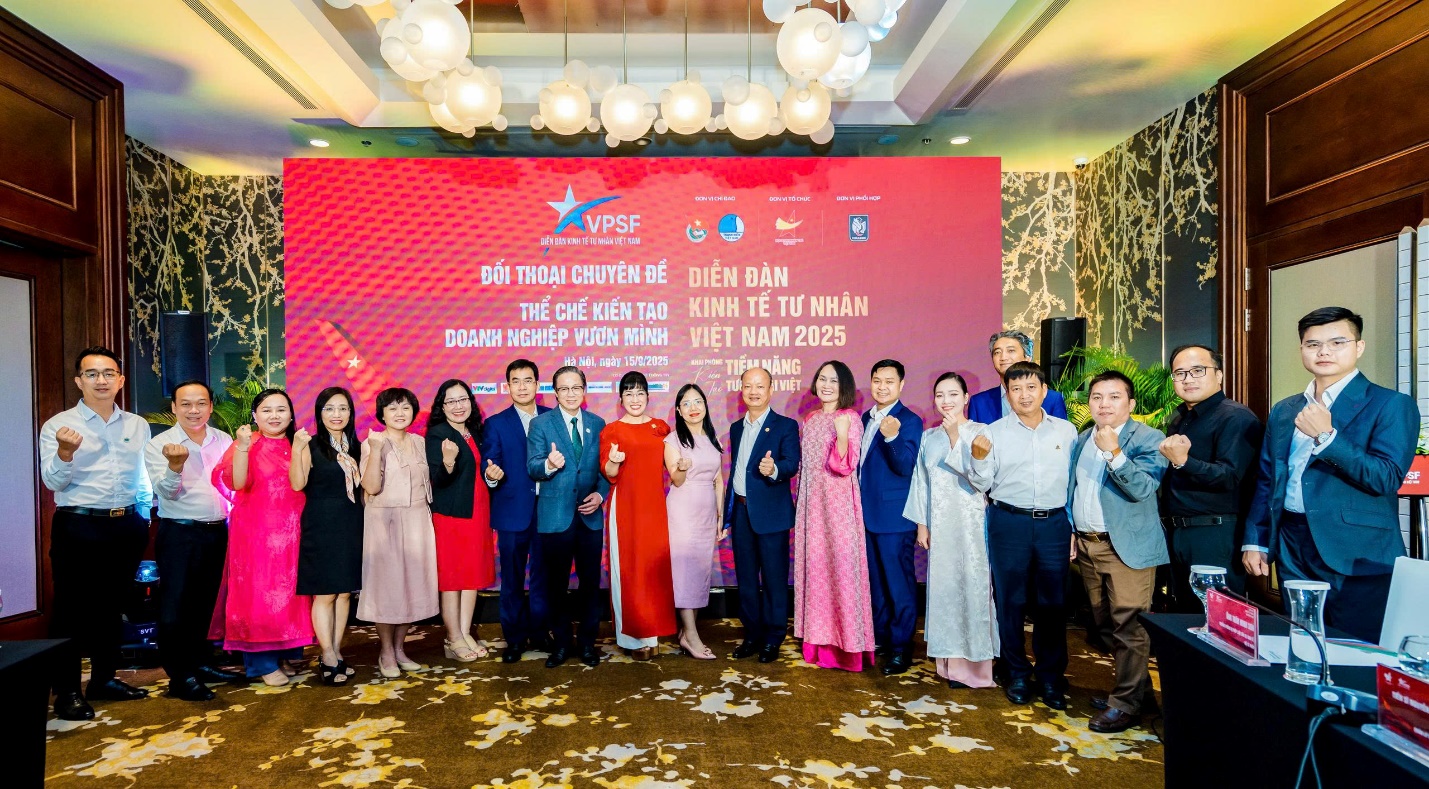"To affirm and further unleash the role of the private sector in driving the nation’s sustainable development and prosperity, the collective commitment of the entire political system, social organizations, along with the active participation of the press and media in amplifying policies and resolutions on private sector development, is essential," stated Ms. Luu Thi Thanh Mau, CEO of Phuc Khang Corporation and Vice President of the Vietnam Young Entrepreneurs Association.
She delivered these remarks in her capacity as Deputy Head of the Organizing Committee of the Vietnam Private Sector Forum 2025 (VPSF 2025) and Chair of the Legal Dialogue Session.

Ms. Luu Thi Thanh Mau, CEO of Phuc Khang Corporation and Vice President of the Vietnam Young Entrepreneurs Association, delivered remarks at the Legal Dialogue Session
On September 15–16, 2025, in Hanoi, the Vietnam Private Sector Forum 2025 (VPSF 2025) took place with dynamic thematic dialogue sessions and a high-level plenary meeting.
The event was attended by Prime Minister Phạm Minh Chính together with nearly 1,000 delegates, including leaders of the Party, State, Government, and central and local agencies; representatives of international organizations; and a broad gathering of experts, scholars, and members of the nationwide private business community.
Institutional Reform to Drive Private Sector Growth
The development of Vietnam’s private sector goes beyond supportive policies; more importantly, it requires a comprehensive reform of the legal and institutional framework. According to experts and speakers, institutional reform not only helps reduce transaction costs and safeguard property rights, but also fosters a fair and competitive business environment.
"Institutional frameworks play a pivotal role in shaping the incentives and behaviors of economic actors, thereby determining the efficiency and sustainability of growth," noted Dr. Lê Trường Sơn, Rector of Ho Chi Minh City University of Law, and Dr. Đỗ Thanh Trung, Lecturer at the Faculty of Administrative and State Law.
In her keynote report as Chair of the Legal Dialogue Session, Ms. Luu Thi Thanh Mau, CEO of Phuc Khang Corporation, emphasized: "The business community continues to face numerous bottlenecks, including inconsistent legal frameworks, burdensome administrative procedures, the absence of grassroots-level policy feedback mechanisms, limited access to resources, and, most notably, significant legal gaps in areas of innovation and digital assets."
During the discussion session, leading economic and legal experts candidly highlighted several pressing challenges: overlapping and inconsistent legal codes; cumbersome and time-consuming administrative procedures; the risk of "criminalizing" economic and commercial relations; and critical legal gaps in emerging areas such as digital assets, innovation, and green transition.

The thematic dialogue session brought together leading economic and legal experts, along with distinguished representatives of Vietnam’s private business community
To further advance the private sector in the coming period, experts put forward several key recommendations on institutional reform:
1. Ensure stability, transparency, and consistency within the legal system.
2. Enhance the effectiveness of law enforcement and implementation.
3. Refine the legal framework in a way that promotes private sector growth and strengthens overall economic performance.
On the issue of administrative reform, experts, business representatives, and the session chair reached consensus on several priorities: simplifying administrative procedures; establishing a "Three Easy" legal information portal—easy to access, easy to understand, and easy to comply with; and creating an effective policy feedback mechanism to reduce the "hot above, cold below" gap in enforcement. These measures are seen as the key to "unlocking the energy" of hundreds of thousands of private enterprises—the driving force making an ever-growing contribution to GDP, job creation, and national innovation.
Business Community as a "Co-Creator" of Institutions
"Vietnam is facing a situation where technology cycles are shorter than legislative cycles, leaving many sectors in a legal vacuum. More than 60% of digital startup models still lack a clear regulatory framework. We need to build an ‘adaptive and anticipatory’ legal system to seize opportunities while mitigating risks," stated Mr. Nguyễn Hồng Phong, Deputy Head of the VPSF 2025 Organizing Committee, Vice President of the Vietnam Young Entrepreneurs Association, and CEO of Tien Nong Agri-Industrial Joint Stock Company.
Breakthrough Proposals for Institutional Reform: Key proposals to address these challenges include: establishing multi-sector sandboxes with defined trial periods and clear KPIs; applying laws based on regulatory principles rather than overly detailed provisions; creating a Center for Technology Forecasting and Impact Assessment; instituting a regular legal review mechanism (at least every 18 months); building an open, transparent online platform for policy co-creation; and introducing incentives—such as credit, tax, and legal support—to encourage enterprises to participate in pilot initiatives.
These proposals are expected to create a flexible and responsive legal framework capable of keeping pace with innovation—recognized as a critical driver of private sector growth in the digital era.
Beyond legal reform, the business community also raised strategic perspectives on urban development and green transition. Vietnam’s major cities, they noted, stand at a historic crossroads: to transform into modern, sustainable, and green metropolises, or risk falling into a trajectory of decline.
According to Mr. Đinh Hồng Kỳ, Chairman of the Ho Chi Minh City Green Business Association (HGBA) and Chairman of the Board of Secoin Corporation, Vietnam’s new urban centers must not be defined solely by skyscrapers, but by their ability to live in harmony with nature, uphold social equity, and harness the strength of pioneering green enterprises.
Embracing the spirit of "co-creation," the dialogue reaffirmed that only through the joint efforts of the State, research institutes, universities, training institutions, and the business community can an enabling institutional framework truly serve as a launchpad for the sustainable growth of the private sector—the vital driving force of Vietnam’s economy.

The proposals put forward at the Legal Dialogue Session centered on the goal of "co-creating" solutions among the State, enterprises, research institutes, universities, and training institutions
The Legal Dialogue Session in particular—and the VPSF 2025 Forum as a whole—did not stop at identifying challenges. More importantly, each working session underscored the readiness of Vietnam’s business community to share responsibility in co-creating institutional reforms together with the State, Government, and relevant authorities to remove barriers and pave the way for growth.
As the private sector increasingly asserts its role as a driving force of the economy, the aspiration for a transparent, stable, and forward-looking institutional framework has become a shared goal. From this aspiration, Vietnamese entrepreneurs are not only rising strongly at home but also gaining the confidence to break through on the global stage.





Bạn không thể gửi bình luận liên tục. Xin hãy đợi
60 giây nữa.